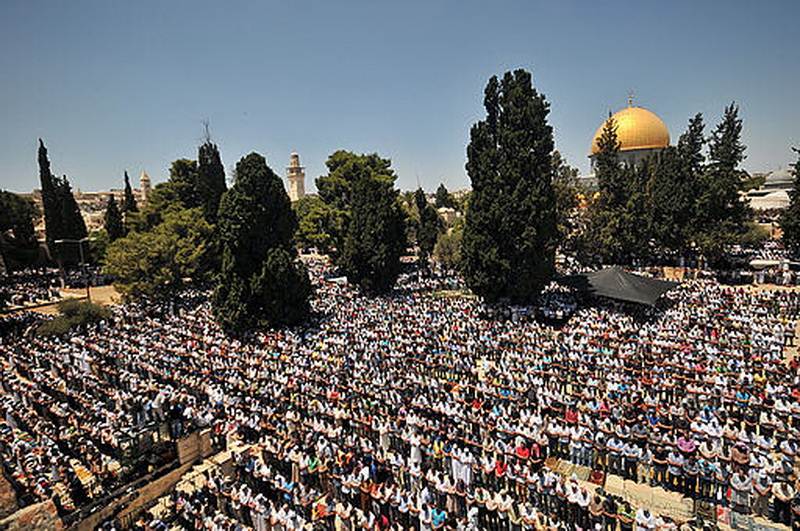www.aljazeerah.info
Opinion Editorials, December, 2016
Archives
Mission & Name
Conflict Terminology
Editorials
Gaza Holocaust
Gulf War
Isdood
Islam
News
News Photos
Opinion Editorials
US Foreign Policy (Dr. El-Najjar's Articles)
www.aljazeerah.info
|
Netanyahu's Son Proposes a Bill to Prohibit the Call for Prayer in Jerusalem, in Another Anti-Islam Provocation By Uri Avnery Al-Jazeerah, CCUN, December 1, 2016 |
 |
 |
|
| Palestinian Muslims praying at Al-Aqsa Mosque in Al-Quds (Jerusalem), the third holiest Islamic shrine on Earth |
Editor's Note:
The Islamic call for prayer is the equivalent of the bell ringing in Christian churches and the Jewish call to the Shabbat. However, the proposed Israeli occupation parliament (so-called Knesset) bill singled out Islamic places of worship, mosques, for the prohibition.
***
The Call of the Mu'ezzin for Islamic Prayer
The
first mu`ezzin stood on the roof of the prophet Muhammad's home in Medina,
during his exile from Mecca, and called the believers to prayer. He also
walked along the streets, doing the same.
When Islam became the
established religion, minarets were built. Their original purpose was to
ventilate the mosque, letting the hot air out and thus drawing the cooler
air in. The mu'ezzin climbed to the top and intoned the 'azzan, the call to
(Islamic) prayer. Often a blind man was chosen, so he could not look into
the homes below.
The word is closely connected with the biblical
and modern Hebrew word "ha'azinu" ("listen").
Lately, electric
loudspeakers make the job of the mu'ezzin much easier. Nowadays, he can sit
below and use a microphone. If a recording is used, the mu'ezzin becomes
altogether superfluous.
Anyway, the voice of the mu'ezzin must come
forth five times a day and call the believers to prayer, which is one of the
five pillars of Islam.
The first call is sent out before dawn. And
there’s the rub, as Hamlet would have said, if there had been minarets in
Denmark in his time.
SINCE PALESTINE was conquered by the army of
the Khalif Omar in the year 636 A.D., the voice of the Mu'ezzin has been
heard five times a day in most of the country's towns and villages. (Some
Arabs villages remained Christian and sounded bells.)
No more, if
Yai'r Netanyahu has his way.
Yair (25) is the crown prince in
Israel's royal family. He is the darling of his assertive mother and walks
around with four bodyguards paid for by the taxpayer (me). He seems to be a
nice if nondescript person. He loves nightclubs and luxury. He also likes
his sleep.
But how can one sleep in Jerusalem if a nearby mu'ezzin
wakes one up at 4 o'clock in the morning?
This is not only Ya'ir's
problem. Many Jews in Israel live near mosques, especially in mixed towns
like Jerusalem, Haifa and Jaffa. The mu'ezzin wakes them up in the middle of
their sweetest dreams, just when the beautiful maiden is about to give in
(or vice versa for women). They may be furious, but they know that they can
do nothing about it.
But Ya'ir can.
He has induced his
father to propose a bill that
would forbid the use of loudspeakers
in all houses of worship. When the powerful
Jewish orthodox faction protested, since this would also forbid the call to
Shabbat, the bill was amended and now mentions
mosques specifically. This may be annulled by the Supreme
Court on grounds of discrimination. In the meantime, Ya'ir is still aroused
from his precious sleep.
***
Share the link of this article with your facebook friends
|
|
|
|
||
|
||||||


